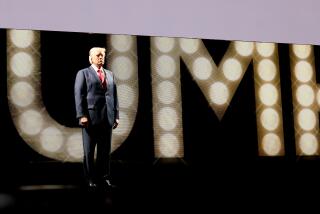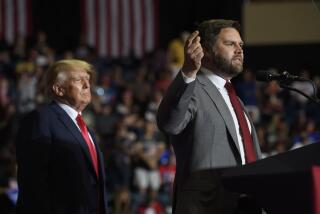GOP’s Comeback Trail Looms as Long, Bumpy : Politics: Leaders must confront not only resurgent Democrats, but intraparty struggles that threaten unity.
- Share via
WASHINGTON — “We’re back to square one,” Republican leader William J. Bennett says in the aftermath of the Nov. 3 election that wiped out nearly all the gains the party had made in the era of Presidents Ronald Reagan and George Bush.
With the dozen years of Republican control of the White House and dominance of the national political agenda at an end, all that is clear about the GOP’s future is that its comeback trail will be long and rigorous.
Not only must Republicans contend with a resurgent Democratic Party under President-elect Bill Clinton, they also need to resolve potentially explosive disagreements that exist within their own ranks. Hardest to duck among these is the highly emotional dispute over the role of the religious right in shaping the party’s policies and picking its candidates.
The early lines of the intraparty debate over this and other issues are already emerging as Republican leaders gather today in Lake Geneva, Wis., for a three-day post-mortem on the 1992 campaign. Meanwhile, in Washington, competing factions are maneuvering for position in the forthcoming contest to pick the national party chairman who will take over when President Bush leaves office.
Closely linked to these battles is the longer-range clash pitting personalities and ambitions that will culminate in the party’s 1996 presidential nomination.
“Under the rubric of policy, you are going to see an awful lot of turf battles going on,” said Brent Bozell, who was finance chairman of Patrick J. Buchanan’s challenge to Bush’s renomination. “A lot of the ideological debate is just going to be code words for personal posturing.”
Housing and Urban Development Secretary Jack Kemp, the early front-runner for the 1996 nod and one of the initial proponents of supply-side economics, is expected to draw support from conservatives whose concern about trimming the federal deficit is qualified by their enthusiasm for such activist measures as inner-city enterprise zones funded by tax credits.
On the other hand, Sen. Phil Gramm of Texas, viewed as Kemp’s most formidable early rival and co-author of the now-superseded 1987 deficit reduction law that bore his name, is likely to appeal to apostles of traditional Republican economic policy, whose main objective is limiting the role of government and holding down its cost.
Gramm will be among those speaking at the Lake Geneva meeting, which is hosted by the Republican Governors’ Assn., as will another advocate of fiscal discipline and a possible 1996 contender, Senate Minority Leader Bob Dole of Kansas. As a result of the November elections, there will be 18 GOP governors.
Also on hand will be Vice President Dan Quayle, who many believe needs to establish his own political identity in the wake of the defeat of Bush, his chief patron.
“I think his inclination is to look ahead eight years,” said one associate. But this ally adds that Quayle could be “an excellent consensus choice” in case of a divisive fight for the 1996 nomination.
While early speculation about the next presidential campaign is inevitable, most of the early intra-party turmoil is in the arena of ideas. Here, ferment abounds.
For example, Bennett, Kemp, Rep. Vin Weber of Minnesota and William Kristol, Quayle’s top staffer, met recently to discuss the possible creation of a policy organization resembling the Democratic Leadership Council. That group, which Clinton headed until he announced his presidential candidacy last year, is credited with developing some of the centrist positions that helped the Arkansas governor regain the White House for his party.
One aim of the incipient Republican efforts is to remedy what Bennett, who served Reagan as education secretary and Bush as czar of the war on drugs, believes was the fatal defect in Bush’s reelection campaign: “The lack of a clear, coherent, compelling core message.”
Developing agreement on such a message is bound to be a daunting task, particularly because of the controversy over how the concerns of the religious right fit into the future GOP vision for the country.
For the present, at least, the religious right is on the march across the national political landscape. With more than 300,000 members in his Christian Coalition, religious broadcaster Pat Robertson told The Times that his goal over the rest of the decade is to build membership up to 1.75 million--or about 10 people in every voting precinct.
“We’re in this for the long haul,” Robertson said. “The agenda of the Christian Coalition is relatively simple--to get evangelicals, pro-family Roman Catholics and Greek Orthodox believers into the political process, to teach them how to be engaged in party activities and how to run for office.
“I hope the influence of Christians in American politics will grow,” Robertson said. “But the thought I have is one of inclusion, not exclusion. We don’t want to shut people out. We want to bring people in.”
It is generally agreed that the traditional values espoused by religious conservatives are important to many Republicans--and to many Democrats and independents, for that matter. But the adamant stands taken by the religious right, particularly its absolute opposition to abortion rights, are by their nature “polarizing issues,” said UCLA political science professor John Petrocik.
“They are pretty hard to compromise. It’s not like dealing with a tax bill,” he said.
Some Republicans fear that increasing influence exerted by the religious right will hamper the GOP’s effort to recover from its November defeat.
To keep that from happening, Rep. Tom Campbell (R-Palo Alto), who gave up his House bid for an unsuccessful Senate campaign, is forming a national political action organization that will emphasize loyalty to the Republican Party “on the basis of economic and fiscal responsibility.” The group will make a point of welcoming all comers, regardless of their religious principles or abortion views.
Looking ahead to the 1996 presidential campaign, Campbell said: “We intend to identify candidates who espouse these principles and get behind them where we think we have a chance of making a difference.”
His goal is a national membership of about 250,000. “We wish to be formidable,” said Campbell of his as yet unnamed organization, whose board of directors is to include another retiring GOP lawmaker, Sen. Warren B. Rudman of New Hampshire.
But whatever problems the Christian conservatives may cause the GOP, some Republicans believe the party cannot prosper without them. In an election when many members of constituencies that had backed the GOP since 1980 deserted to Clinton or to independent candidate Ross Perot, the Los Angeles Times exit poll showed that 56% of white, born-again Christians voted for Bush, compared to 25% for Clinton and 19% for Perot.
In his new book, “Populism and Elitism,” former Reagan adviser Jeffrey Bell argues that the GOP’s focus on traditional values helped create the Republican coalition that, for the most part, had dominated presidential politics since 1968.
In that year, Bell notes, Richard M. Nixon ran against crime in the cities and dissent against the Vietnam War. And in 1972, when he won reelection by a huge margin, Nixon campaigned against the so-called three A’s--acid, amnesty and abortion.
“For the Republican Party to go from this election where we lost the argument on economic issues and also to drop values issues would be close to suicidal,” Bell said.
“The Christian conservatives have become a larger and larger part of the party’s grass roots,” agreed Charles Black, a senior adviser to the Bush campaign who is among those considering a run for the national chairmanship. “So you need them. And one challenge for the next chairman will be to keep everybody under the party umbrella.”
The solution, some Republicans contend, may be in moderating the arguments about traditional values that are the mainstays of the religious right and broadening their appeal.
“The main thing is to talk about values in a positive way, rather than as a club,” said Bennett, now a senior fellow at the Hudson Institute, a conservative think tank. Instead of using family values to “bash gays,” said Bennett, they should be viewed as a way to discuss the purpose of the family and the rearing of children.
While the arguments over the religious right may stir the most emotion, other controversies abound, particularly on the party’s position on the role of the federal government.
“The world has changed on its axis in the past 20 years and our 20-year-old campaign didn’t fit that world,” said William McInturff, a Republican pollster who is among those who contend the party needs to promote a way of putting government to use instead of just denouncing it.
“I think there will be a long debate over exactly where to go,” said Quayle aide Kristol, who believes this month’s election results showed that “when the American people think there are problems, they want government to address those problems and show how they can be solved.”
Added Kristol: “It doesn’t mean you need big government. But the notion that you can simply keep hands off is probably just not possible anymore.”
Other GOP strategists, citing exit poll data showing strong voter sentiment against big government and higher taxes, claim the GOP should stand firm on its traditional opposition to government. “There’s nothing wrong with our message; we just need someone who can articulate it better than Bush did,” said American Conservative Union chairman David Keene.
The first potential test of strength in the competition over ideas and ambitions will come in the next few weeks as the contest for the replacement for party national Chairman Richard N. Bond takes shape. The choice will be made by the Republican National Committee early next year.
Along with Black, possible candidates include outgoing Missouri Gov. John Ashcroft; Spencer Abraham, head of the Republican Congressional Campaign Committee; former Reagan aide Haley Barbour; veteran party leader Howard (Bo) Callaway; former Delaware Gov. Pierre S. (Pete) du Pont IV; Labor Secretary Lynn Martin, and Weber, who is retiring from Congress.
Party leaders say they are looking for a candidate who would not be considered a stalking horse for a presidential contender and who could be an effective voice for the GOP at a time when the party will no longer be able to depend on an incumbent President to make its case.
Even in the choice of a party chairman, one potential point of friction is the abortion issue. The possible candidacy of Martin, who supports abortion rights, is causing concern among those on the other side of that issue.
“I would find her totally unacceptable,” said Angela (Bay) Buchanan, who managed her brother Pat’s 1992 presidential campaign and is preparing for another attempt in 1996. “She is an advocate for that position (supporting abortion rights).”
But Robertson, despite his adamant opposition to abortion rights, said he would not be against Martin’s candidacy on those grounds alone.
Robertson and Bay Buchanan do agree on one thing--that the model for the next Republican boss should be Democratic National Chairman Ronald H. Brown. Although his candidacy was initially opposed by some Democrats because of his ties to party liberals, he is credited with helping chart the centrist course that Clinton followed to victory.
The GOP Slide
Ronald Reagan’s presidential victory in 1980 increased the ranks of Republicans across the political spectrum, giving rise to GOP hopes that a trend was under way. But in the wake of 1992’s balloting, the 1980 election may be seen as a high-water mark for the party. Here is a look at the numbers then and now:
Following ’80 Following ’92 election election Senate 53 42 House 192 175 Governors 24 18
More to Read
Get the L.A. Times Politics newsletter
Deeply reported insights into legislation, politics and policy from Sacramento, Washington and beyond. In your inbox twice per week.
You may occasionally receive promotional content from the Los Angeles Times.










